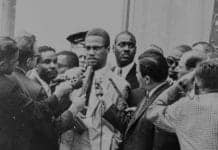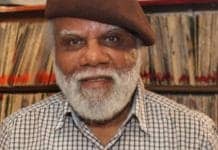
Atlanta’s CNN Center was the site of a rally July 26 for imprisoned freedom fighter Imam Jamil Al-Amin, formerly known as H. Rap Brown.
A national annual gathering of Muslims initiated by Al-Amin, the Riyaadah, was taking place here and brought supporters of the political prisoner from cities across the country, including Mobile, Ala., Washington, D.C., New York City and St. Louis.

A fearless leader of SNCC (Student Nonviolent Coordinating Committee) in the dangerously violent Jim Crow South, Brown built powerful campaigns for voting rights and local empowerment in rural Alabama in particular. He was targeted by the FBI’s infamous COINTELPRO, under constant surveillance and harassment, was forced underground and sentenced to prison in New York state, where he converted to Islam.
Following his release, he moved to Atlanta’s West End where he successfully organized the community to challenge drug dealers, corrupt cops and absentee landlords who were abusing and destroying this historic Black neighborhood.

At the rally, pedestrians were handed leaflets detailing the elements of the frame-up of the well-known activist and religious leader in the March 2000 shooting death of a Fulton County Sheriff’s deputy and the wounding of a second. Al-Amin has consistently declared his innocence of the charges. Another man, Otis Jackson, has confessed to being the shooter.
There were numerous inconsistencies in the “evidence” presented by the state, including the surviving deputy’s description of the shooter as being 5-feet-10-inches with “cold grey eyes.” The deputy insisted the perpetrator had been wounded in the exchange of gunfire. The 6-foot-5-inch brown-eyed Al-Amin had no injuries when he was captured. Nevertheless, he was convicted in 2002 and sentenced to life without parole.

Fearing Al-Amin’s influence among prisoners at the state institution where he was held, Georgia turned him over to the Federal Bureau of Prisons in 2007. For the next seven years, Al-Amin was incarcerated in solitary confinement in Colorado’s supermax Florence ADX.
While his spirit has stayed strong, the years of medical neglect and harsh prison conditions have impacted Al-Amin’s health and spurred the movement to win his freedom.

The rally heard from a variety of national and local speakers, including Al-Amin’s son, Kairi, who called for a maximum effort to bring his father home because “we need his leadership now.”
There are plans for numerous educational outreach events to the public during the month of August and a national conference in Atlanta in October to mobilize a grassroots movement on his behalf.
For more information, go to imamjamilactionnetwork.weebly.com or write Jamil Al-Amin, 99974-555, USP Tucson, P.O. Box 24550, Tucson, AZ 85734.
Mathiowetz was an invited speaker at the rally, representing Workers World Party; she can be reached via wwp@workers.org. This story first appeared on Workers World.

Legal update
In “Court rules against militant formerly known as H. Rap Brown,” ABC News reports: “A prosecutor violated the constitutional rights of the 1960s black militant formerly known as H. Rap Brown during his trial for the killing of a sheriff’s deputy, but it’s unlikely that substantially affected the verdict, a federal appeals court found.” The ruling was issued on July 31.
“Al-Amin alleges that a prosecutor at his trial violated his constitutional rights and the court failed to take adequate steps to fix that violation. A federal judge rejected his challenge and the 11th U.S. Circuit Court of Appeals affirmed that ruling,”
A three-judge panel of the 11th Circuit agreed with the trial court’s findings that the prosecutor committed a substantial constitutional error and that the court’s attempt to lessen the harm was ineffective. However, the panel rejected the claim that the prosecutorial error substantially affected the jury’s verdict.
“We regret that we cannot provide Mr. Al-Amin relief in the face of the prosecutorial misconduct that occurred at his trial. A prosecutor’s duty in a criminal proceeding is not to secure a conviction by any means, but to ensure that justice will prevail,” Circuit Judge Charles Wilson wrote in the opinion. “The prosecutor at Al-Amin’s trial failed to live up to that duty.”

 Store
Store












